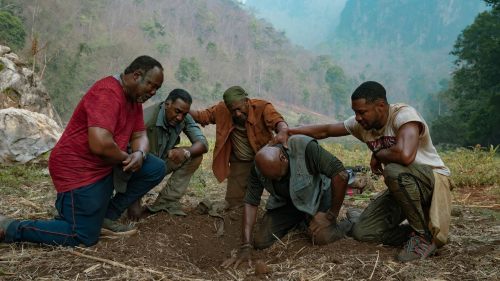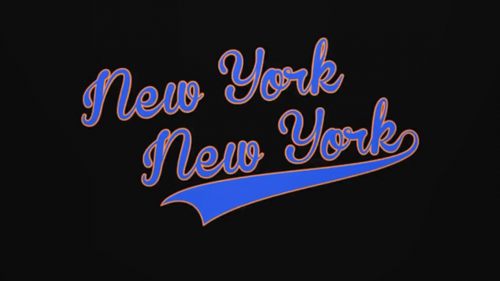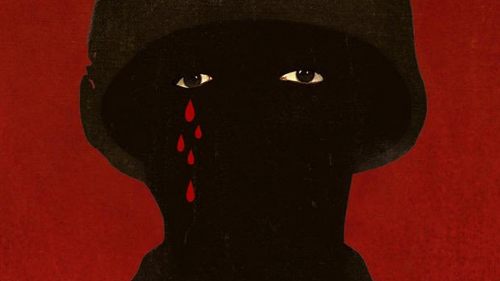CHI-RAQ’s No-Nonsense Attitude To Gun Violence Is Timeless
I Am Not Your Negro is out in theaters now (buy your tickets here). To celebrate, we present a week of articles honoring the film.
Chi-Raq begins in the most extraordinary manner; with a four-minute long overture projecting blood-red lyrics against a black screen, as spat out by Nick Cannon's rapper (who shares his nickname with the title). This is Spike Lee's no-nonsense way of introducing us to the world of his film, the implication being that blood will be spilled before we've even settled into our chairs.
In one of many real-life tie-ins, Cannon developed the opening track with a Chicago South Side (where the story takes place) man named Hypno Carlito, who impressed upon him the difficulty of his day to day life there. "Please pray for my city," Cannon intones, reminding us he doesn't live in "no fuckin' Chicago".
The title, a reference to the fact there have been more gun-related casualties in the murder capital of the US than in the Iraq war, establishes a take-no-shit approach to material most mainstream audiences will find difficult to swallow. Lee himself refused to apologize for, or change it (fair, considering it originated with local rappers).
We're thrown immediately into the fray, with a brutal, yet realistically messy shootout at a club show, which Chi-Raq himself is confidently headlining. Unperturbed by one of his henchmen being shot (it's all part of the cause) Chi continues on with his business until his girlfriend's house is burned down, forcing him into action.
The young, wannabe gangster responds the only way he knows how: by running into the street armed with a huge automatic weapon, firing off rounds at the receding parties. His answer to violence is more violence.
Chi-Raq is a brash, vibrantly-coloured and very modern take on a Greek comedy (Aristophanes' Lyristrata), but its core emotion is anger. Uncomfortable, unavoidable, and often uncontrollable anger. The interpolations between stylised iambic pentameter, delivered by an impressive cast, and real-world references to the slaying of young black people by cops and gang-members alike roots the story in the here and now. It gains more traction as we watch.
Notably, it takes the wildly extravagant idea of a sex strike (and a good two hours of diverting plot-lines and musical interludes) before any blame is taken or anything resembling peace is approached. The message is clear: major steps need to be taken to combat this issue. Lee, as a storyteller and activist alike, has had enough. And we, as an audience living in a world uncomfortably close to the lurid, inescapably violent one he presents, should have had enough too.
In casting real-life victim of gun violence, and Chicago native, Jennifer Hudson (three members of whose family were shot and killed), Lee further anchors his often fantastical story in the real world, in our world. Members of Purpose Over Pain also appear, holding up photos of their deceased children in an effort to hammer the point home, to both the characters and the audience.
The take-no-shit attitude of Chi-Raq's female protagonists mirrors Lee's. There will be no more discussion, no more false promises, only action. The stand they take also echoes that of the recent women's marches against Trump. Only, in the world of the film, it brings about considerable change.
This is a hugely political movie, and unashamedly so. John Cusack's preacher (based on a real person, and the only white character), points out, over the course of a thrillingly lengthy sermon, how the government is in the pockets of the NRA, that it's easier to buy a gun than a computer and that black men are gunning each other down, doing the work of the predominantly white higher-ups for them.
As he speaks, Cusack delicately dangles a hand-gun in front of a congregation who barely blink at his brandishing a weapon. They're too used to them, living in an area in which "sirens and gunshots are our soundtrack", and where a child is gunned down in the midst of a drive-by in broad daylight.
The central conceit of Chi-Raq (a group of rival gang members' girlfriends unite for a sex strike in a desperate attempt to halt the violence in their community) may be fantastical, and its ambitions considerable, but the message is strong. Lee isn't claiming to have all the answers, but he does make the point that gun crime against black people must be stopped from all angles – particularly internally.
Angela Bassett's exhausted, grieving mother further explains how the US pays out to rehabilitate communities in Iraq and Afghanistan, but leaves black communities to murder each other in poverty. Horrifying events such as the Sandy Hook massacre make things even more difficult because "when they murder white babies and things don't change, saving black lives is way outta range".
The attention-grabbing verse, much of it rhyming couplets, might seem like a deterrent for a movie this dense, and with its finger firmly on the pulse of urgent, real-world issues. But thanks to its hip-hop style delivery from a cast of committed performers (including Bassett, Cannon, Wesley Snipes and firecracker lead Teyonah Parris), long swathes of wordy dialogue are tight, rat-a-tat quick and frequently very funny.
Rather than choking on it, the actors spit their lines out with confidence and authority, none more so than the traditional chorus, which takes the form of (who else?) Sam Jackson. Resplendent in a variety of garish suits, Jackson's assertion that Aristophanes "made that shit rhyme" immediately roots the story in the present day.
His Dolmedes mostly takes a backseat, allowing Parris' ass-kicking Lysistrata to rightfully take her place front and centre (she's also probably the only other cast-member with more eye-catching outfits). She's inspired by Bassett, who turns her on to a Liberian activist who instituted a sex strike to combat civil war atrocities (another real-world tie).
The flick was initially criticised, off the back of an early teaser trailer, for making light of serious issues. Sure, it flirts with farce at times - the ladies wear literal chastity belts, take over an armoury and their strike quickly goes global, with prostitutes and strippers taking a stand alongside them - but Chi-Raq never feels ham-fisted.
It's colorful, the warring gang shades of purple and orange vivid throughout until the women unite in camouflage, but even the more ludicrous moments are tinged with truth. When the ladies first take their "no peace, no pussy" oath, Lysistrata argues that rather than the non-stop gun crime being just "how they live" it's also, more pertinently, how they will all inevitably perish.
Watch as Hudson's devastated mother scrubs her child's blood off the street, or when a cop and a gang-banger simultaneously shoot off rounds directly at the camera, Jackson stoic between them. The implication is there's no real difference between the two wildly contrasting images. We are all affected.
Produced, directed and co-written by Lee, this is an intensely personal film for which he struggled to find a home (it was eventually bought by Amazon Studios). Polemic and honest, it takes no prisoners (much like Lysistrata herself). There's a cutting, contemporary resonance that's impossible to ignore, even in the lighter moments.
It's also scarily relevant, particularly today. Lee noted in interviews that 65 people were murdered, and a further 331 wounded, while Chi-Raq was being filmed, negating any criticism he received for supposedly painting a negative picture of the city. His focus is on gun crime in general, as opposed to taking any strict stance via one particular movement.
Lee's target, then, is everyone who's contributing to gun-related deaths across the US, his story beginning with a warning message, "This is an emergency", repeated over and over like a siren.
Lee is far from subtle, but he bludgeons us over the head with these messages because he has to, because it seems as though nobody is listening and nothing is changing. As a result, he's produced a furious, ferocious and fucking vital call to (dis)arm that hopefully won't feel quite as relevant once another thirty years have passed.
The final, rallying cry of Chi-Raq is simply "Wake up".



